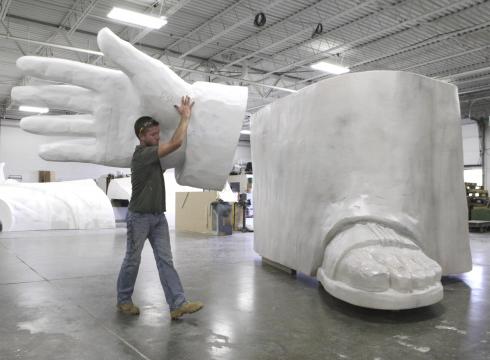
Late in the winter of 2003, the weather report was calling for record amounts of snow to fall on the small city where I was attending college. But no one could have predicted the record moment in my own life that would happen that day. By the time the snow stopped falling, I had thrown a TV out of my second-story window and made my first trip to a psychiatric hospital.
In the years since, I have been hospitalized four times and have struggled with the frustrating and sometimes heartbreaking ups and downs of bipolar disorder.
While I can’t honestly say I’m glad to have a mental disorder, I do feel grateful for the way God has used it to enlarge my view of Him as He replaces my simplistic and moralistic childhood faith with something far more substantial: Trust in a God who has promised to complete what I cannot.
My Illness Does Not Define Me
When I was first diagnosed, I felt like I had suddenly become a different person. I started to think of myself as crazy and sick. Even when I was feeling well, I still saw myself as somehow damaged and therefore less lovable than other “normal” people. Just as some people find their identity in their jobs, their wealth or their relationships, my identity was in my strong mind. As my bipolar attacked what felt like my greatest asset, I began to view my illness as the whole definition of who I was.
The problem with defining myself by my disorder was that it didn’t leave any room for my identity as a beloved child of God. In 2 Corinthians 5:16-17, Paul says that “From now on we regard no one from a worldly point of view … Therefore, if anyone is in Christ, the new creation has come: the old has gone, the new is here!” I realize more and more every day that this verse means I am not my illness and I am not defined by the way the world may look at me. My only identity that matters is my identity as God’s much-loved daughter, a sister of Christ Himself.
God Honors Weakness and Values Honesty
Our culture tells us that showing weakness will turn people away. We all put so much energy into looking perfect on the outside that we often miss out on opportunities to truly connect with one another as the people we really are. In my late teens I made the decision to tell a few people I trusted about my struggles with mood swings and hallucinations. As scary as it was to face their possible rejection, I was rewarded with deeper friendships and more honest relationships with those around me.
As I get older, God continues to challenge me to share my story with more and more people. I have been amazed at the way that sharing something as simple as the fact that I sometimes feel depressed can open up a conversation in surprising and amazing ways. When people hear my willingness to admit that I don’t have it all together, they feel free to be themselves around me and stop trying to hide their own flaws and insecurities.
It’s still scary sometimes to tell new people that I have a mental illness, but God has blessed these conversations and I’ve gotten to hear some powerful stories from some wonderful people as a result of sharing my own weakness.
The More I See My Need For God, The More I See His Love For Me
For years after beginning to experience symptoms of a mood disorder, I thought that I could heal myself if only I mustered all of my strength and just focused really hard on getting better. I really believed that if I just tried a little harder, smiled a little bigger, acted a little calmer—I could fix all of my problems. I didn’t really believe I looked anything like “a new creation” but felt the burden of bridging that gap on my own. It wasn’t until I checked myself into a mental hospital for the first time that I finally realized that if Christ is in me, my health and healing would have to be all Him because I could no longer pretend to do that job myself.
Incredibly, once I admitted that I truly needed God, that I couldn’t continue in life without His help, I felt a tremendous wave of His love and understood for the first time just how far God was willing to go to help me. The more I understand that I need God, not only to help me be “good” but simply to survive each day, the more I can begin to see that His care for me is not based on my performance or what I have to offer Him, but comes entirely out of His pure and unconditional love for me, just as I am.
Suffering Is a Gift
I’ve been dealing with depression, anxiety, mania and even hallucinations for half of my life. At times, my disorder feels absolutely devastating. My family and close friends suffer too, as they stand by me through the painful and exhausting periods of time when I am taken captive by intense, irrational fear, as well as extreme swings in motivation and energy level. To put it plainly, mental illness really sucks. At times, it feels as though the bad times will never end and that darkness just might overcome me.
Thankfully, the morning always comes. Every time I face that dark abyss of suffering and survive to see another day, I see God’s faithfulness to me even more clearly. If I had the power to control my own life, I would avoid everything unpleasant or uncomfortable, but then I would never see God’s power to overcome evil and to shine light in the darkness. If I never suffered, I would never have any reason to grow or change. If I didn’t have these hard times, I wouldn’t have the chance to exercise my faith and grow in hope.
I consider my mental illness to be a part of a spiritual gift of suffering. The Bible invites believers to share in Christ’s sufferings, but who really wants to sign up for that? Yet, with every season of pain, I grow in compassion for others, in appreciation of God’s mercy and in the strength God gives me to handle pain and discomfort. As my capacity for suffering grows, so does my capacity to feel joy, peace and every other fruit of God’s Holy Spirit. God has used what, on the surface, seems like pointless and unredeemable misery and has turned it into my secret strength. God has used my illness and weakness to slowly and purposefully mold me into the beloved reflection of my creator, the “new creation” that He intends me to be.





















